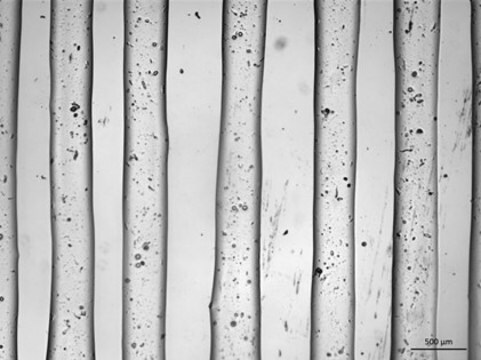926019
TissueFab® bioink kit
(Gel)ma Fibronection -Vis/405 nm, low endotoxin
Iniciar sesiónpara Ver la Fijación de precios por contrato y de la organización
About This Item
Productos recomendados
form
viscous liquid (gel)
size
10 mL
impurities
<5 cfu/mL Bioburden
<50 EU/mL Endotoxin
color
pale yellow to colorless
pH
6.5-7.5
viscosity
3-30 cP
application(s)
3D bioprinting
¿Está buscando productos similares? Visita Guía de comparación de productos
Categorías relacionadas
General description
Gelatin methacryloyl (GelMA) is a polymerizable hydrogel material derived from natural extracellular matrix (ECM) components. Due to its low cost, abundance, and retention of natural cell binding motifs, gelatin has become a highly sought material for tissue engineering applications. Fibronectin is a multifunctional glycoprotein which exists as two major isoforms, one soluble and one insoluble form. The former is present in plasma, whereas the insoluble form resides in tissues and extracellular matrix (ECM) of cartilage. Fibronectin is known to contain integrin binding sequences which facilitate cell-matrix interactions.
Application
The addition of photocrosslinkable methacrylamide functional groups in GelMA allows the synthesis of biocompatible, biodegradable, and non-immunogenic hydrogels that are stable in biologically relevant conditions and promote cell adhesion, spreading, and proliferation. Gelatin methacrylate based bioinks have been used to bioprint osteogenic [1], chondrogenic [2-3], hepatic [4-6], adipogenic [7], vasculogenic [8], epithelial [6], endothelial [9-10], cardiac valve [11], skin [12], tumor [10] and other tissues and constructs. Fibronectin plays an essential role in multiple biological functions such as, angiogenesis, cell migration and differentiation and wound healing. Fibronectin has been used in tissue engineering applications for wound healing and angiogenesis[13], bone repair [14] and studying mechanotransduction[15].
Features and Benefits
In addition to fast gelation, the methacrylamide functional group can also be used to control the hydrogel physical parameters such as pore size, degradation rate, and swell ratio. Temporal and spatial control of the crosslinking reaction can be obtained by adjusting the degree of functionalization and polymerization conditions, allowing for the fabrication of hydrogels with unique patterns, 3D structures, and morphologies.
Legal Information
TISSUEFAB is a registered trademark of Merck KGaA, Darmstadt, Germany
Storage Class
10 - Combustible liquids
wgk_germany
WGK 3
flash_point_f
Not applicable
flash_point_c
Not applicable
Certificados de análisis (COA)
Busque Certificados de análisis (COA) introduciendo el número de lote del producto. Los números de lote se encuentran en la etiqueta del producto después de las palabras «Lot» o «Batch»
¿Ya tiene este producto?
Encuentre la documentación para los productos que ha comprado recientemente en la Biblioteca de documentos.
Nuestro equipo de científicos tiene experiencia en todas las áreas de investigación: Ciencias de la vida, Ciencia de los materiales, Síntesis química, Cromatografía, Analítica y muchas otras.
Póngase en contacto con el Servicio técnico

